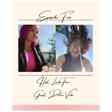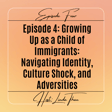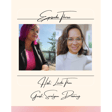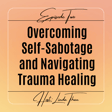
Ep 6 - Healing Together: Celebrating World Refugee Day (June 20th) w/ Ny Derry
Lao Helping Lao Discussion Topics:
1. The Importance of Mentorship and Community Support
2. Challenges and Triumphs of the Lao Community (Lack of resources, relate to any personal experiences and your gathering of data.
3. Future Visions for Lao Helping Lao: Short term 1 year and long term. What would fulfillment look like?
About Ny Derry:
Ny came to the United States as a refugee from Laos in 1980 at the age of 8, along with her parents and three siblings. She attended Broome Community College and then transferred to Binghamton University, State University of New York, where she earned a Bachelor of Science in Social Sciences as a first-generation college graduate.
For over 25 years, Ny has been involved as both a staff and volunteer for the Girl Scouts Council in Michigan. She has been a lifetime member of the Girl Scouts of the USA since 1997.
Ny is the proud mother of two daughters, both of whom are software engineers. During her career break to be home with her daughters, Ny was actively involved in various organizations supporting her daughters' development, such as leading a Girl Scout Troop and serving as the PTA president. Additionally, she mentored her daughter's FIRST robotics team as the Communications Mentor and in the Program Management role. Her involvement with the robotics team inspired her to pursue a certification in coding, leading to her completion of a 10-week Java Developer boot camp. Later, she founded the Girls Who Code Club in Livonia, MI, in the fall of 2017 and continued its activities through 2019.
Ny has been passionate about uniting the Lao/Laotian communities since high school. In 2010, she created the Lao Helping Lao Facebook page to uplift and unite all people of Lao heritage and their allies. In January 2023, Lao Helping Lao became an LLC, marking the beginning of Ny's social entrepreneurship journey.
Opportunities:
Lao Helping Lao wants to be a company that can provide a directory on any subject to help individuals or groups work together rather than compete. Our success means that we can create opportunities that will ensure our future generations are set up for success.
If you are a subject-matter expert or business owner/founder and want to be listed in our directory, contact Ny at info@laohelpinglao.com for an interview. It’s FREE: https://www.laohelpinglao.com/directory.
Also, if you need help with anything, contact Ny for a free consultation to determine your next steps.
Get to know Ny Derry - Past & Present Fun fact: Crew Manager for my husband's car racing hobby, ex-real estate agent, stay-at-home mom career break for 16 years, FIRST Robotic High School Competitive Team mentor, Girl Scout highest Gold Award Advisor, Girls Who Code Facilitator, Empty-nester with an RV to explore
Contact Info:
Facebook: www.facebook.com/LaoHelpingLao
Mention Pure Mending Podcast to get your complimentary 1-on-1
Membership for free consultation for career exploration or development.
Website: https://www.laohelpinglao.com/membership
Subscribe Now! Go check Pure Mending
Website: https://www.pure-mending.com [https://www.pure-mending.com/]
Follow & Like:
Pure Mending FB: https://www.facebook.com/PureMending1
Pure Mending IG: https://www.instagram.com/puremending/





